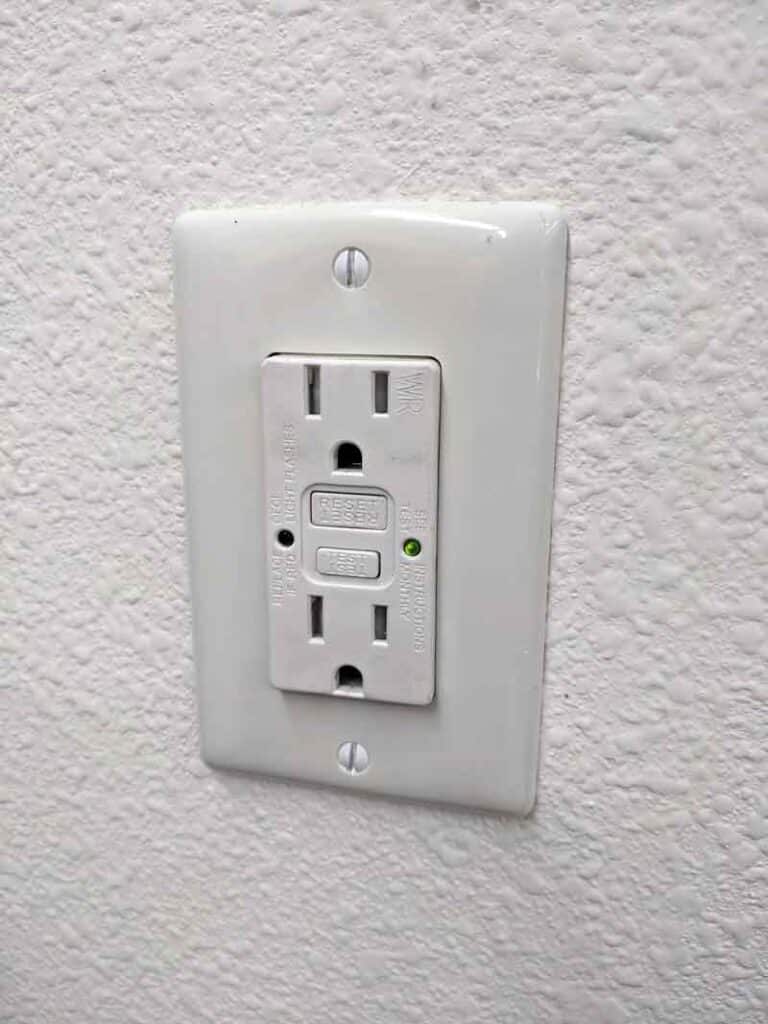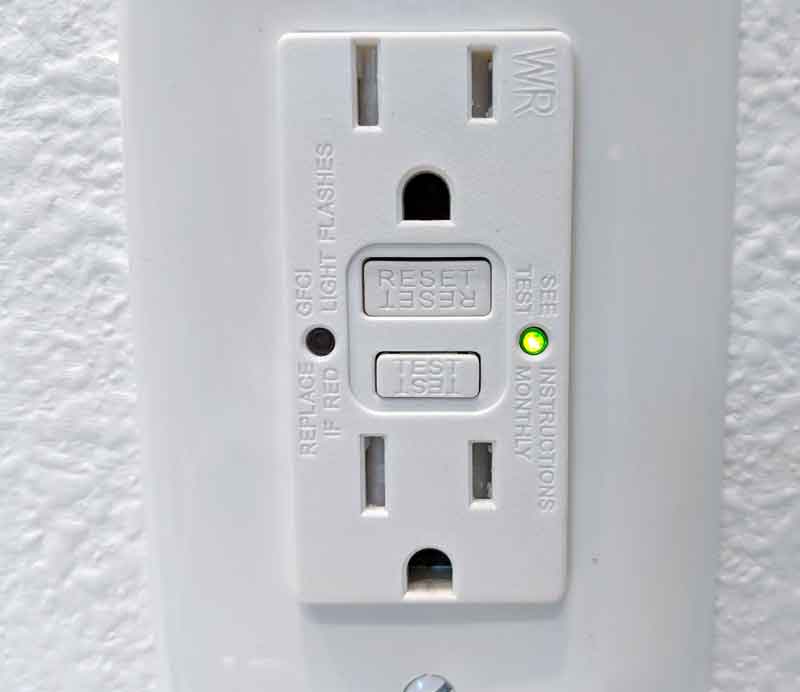Are GFCI outlets required for outlets in your garage? What about garage lights and garage door opener outlets? What is GFCI anyway?
Worrying about GFCI outlets may seem like an afterthought, especially when you want to get into the details of adding additional outlets or lighting for your garage.
But it’s not.

GFCI compliance, as laid out in the NEC, helps save lives. Just as important, if your house lacks GFCI outlets where they should be, it could cause problems when you sell your home later.
Your garage needs to be GFCI protected, according to the 2008 and later editions of the National Electric Code (NEC) handbook. This includes garage door openers and garage lights connected to an outlet. In addition, AFCI protection is required for 5-amp and 20-amp 120/125-volt circuits.
This article will explain what GFCI is and how it can protect you. You’ll also find out which outlets in your garage need to be GFCI compliant.
What Is GFCI?
GFCI stands for Ground-Fault Circuit-Interrupters.
According to code, GFCI protection is found on outlets, cords, and other electrical equipment. They are designed to detect dangerous electrical imbalances.
Here’s an easy example.
When water splashes on an electrical outlet, it typically causes a short circuit. However, the GFCI circuitry kicks to automatically shut off the power to avoid the risk of electrocution.
The NEC, or National Electrical Code, lays out basic safety rules for residential and commercial building construction. It also covers installing electrical devices.
The NEC lists specific cases where ground fault circuit interrupters are required to help protect lives.
GFCI vs. Fuses
At first glance, it seems like GFCI is similar to the fuses in your home’s breaker box.
In reality, they’re very different.
Fuses are designed to protect against electrical fires, whereas GFCI circuitry is designed to protect people from electrical shocks.
A GFCI outlet constantly monitors the electricity flowing between the outlet and the devices connected, cutting off the power when it senses a disruption. When this occurs, the status indicator light on your GFCI outlet may turn red.
You’ve probably seen TV crime dramas where someone was electrocuted in a tub full of water after a hairdryer fell in.
Plugging the hairdryer into a GFCI outlet would have prevented that.
When Are GFCI Outlets Required?
GFCI-protected outlets are required in all bathrooms and many kitchen outlets. This is because electrical appliances are often used near water.
Additionally, almost all outdoor outlets require GFCI because of exposure to rain or snow.
You can tell if an outlet is GFCI-compliant by checking whether there are Test and Reset buttons.
Are GFCI Outlets Required for Garages?
GFCI-protected outlets are required for garages.
According to the NEC, this took effect in 2008 for all 125-volt, single-phase, 15- and 20-amp outlets. In addition, it is also required according to the IRC, or the International Residential Code.
According to the NEC, GFCI-compliant outlets are required for “Garages, and also accessory buildings that have a floor located at or below grade level not intended as habitable rooms and limited to storage areas, work areas, and areas of similar use.”
They specify GFCI-compliant outlets for garages at or below ground level because there’s a high risk of flooding or other water damage with a lower floor.
Let’s look at a couple of specific cases in more detail.
Do Door Opener Outlets Need to Be GFCI Protected?
Yes, even though it is not readily accessible, a garage door opener outlet must be GFCI protected.
In the past, the NEC had exceptions for specific receptacles and outlets. Previously, if the outlet wasn’t readily accessible, it didn’t need to be GFCI compliant.
However, since the 2008 edition of the NEC, that exception has gone away. Now all receptacles must be GFCI compliant.
Do Ceiling Outlets Have to Be GFCI-Compliant?
Similarly, outlets on your garage ceiling must be GFCI-compliant. This was covered by the same exception as the garage door opener outlet above. That exception was removed in 2008 by the NEC.
All outlets in your garage must be GFCI-compliant, regardless of where they are located.
Do Garage Lights Need to Be GFCI Protected?
This depends.
Plug-in lights must be GFCI protected. However, if you opt to hardwire your garage lights, you can skip the GFCI requirement.
I chose to hardwire garage lights in my garage, so I didn’t need to make them GFCI compliant.

Do Garage Outlets Need to Be AFCI Compliant?
AFCI stands for Arc-Fault Circuit-Interrupter. It’s another layer of protection, but this time against fires instead of electrical shocks.
While the GFCI will detect electrical imbalances and shut off the power to prevent electrical shocks, the AFCI will detect sparks or arcs in the wiring to protect against electrical fires.
According to the 2017 edition of the NEC, garage door opener outlets must be both GFCI-protected and AFCI protected.
For any new outlets or buildings, AFCI protection is required for all 5-amp and 20-amp 120/125-volt circuits. This requirement is in addition to the GFCI requirements.
If you’re installing a new receptacle or replacing a receptacle, you may need to install both GFCI and AFCI protection.
Your Local Building Codes May Differ (But Probably Not)
It is important to note that just because the NEC says something, your local building codes are what matters at the end of the day.
For example, they may have yet to adopt the 2017 edition of the NEC, thus eliminating the current AFCI requirements.
That’s why it’s important to always check with your local building code office to see the requirements. In many cases, you’ll also need to pull a permit for your garage project, so they can also help with that.
Generally speaking, the NEC guidelines are a good rule of thumb to follow. It’s rare for local building codes to differ from the NEC regulations.
How to Add GFCI Protection to Your Garage Outlets
Unfortunately, you can’t just add GFCI protection to an existing outlet. Any non-GFCI outlets will need to be replaced.
5-amp and 20-amp 120/125-volt circuits will also need to be AFCI protected if your local building codes have adopted the 2017 edition of the NEC.
You can find dual-purpose AFCI/GFCI receptacles to fulfill both requirements.
For combined GFCI and AFCI protection, you can install a GFCI/AFCI-protected receptacle in every outlet or a single circuit breaker that protects every device along the circuit.
Alternatively, you can do a combination of the two.
For example, you can have an AFCI circuit breaker providing AFCI protection to every device along the circuit and then install individual GFCI receptacles to provide GFCI protection.
In addition, if your local building codes allow it, you can also wire one GFCI receptacle to protect other devices downstream.
Don't worry if your GFCI outlet is still good. The Leviton GFNT1-W periodically tests itself to make sure it can respond to a ground fault. If not, it prevents resetting the GFCI to keep you safe. The slim profile makes it super-easy to install and it's available in several colors.
Can You Install GFCI Protection Yourself?
If you know what you are doing, you can install GFCI and AFCI receptacles yourself. However, it requires running electrical wiring, which can be dangerous, so you may want professional help.
This Youtube video will show you how to install or replace a GFCI outlet:
Why Install GFCI Protection?
The simple answer is that you must install GFCI protection to comply with regulations and local building codes.
Ensuring your garage outlets are GFCI-protected will help protect you and your family. Finally, if your house isn’t up to code, you may have a tough time selling it down the road.
Wrapping It Up
GFCI protection is required for any garage outlets, which helps keep your family safe. Additionally, sometimes, AFCI protection is required and will help prevent fires.
If you still need GFCI protection in your garage, we recommend installing it as soon as possible.

